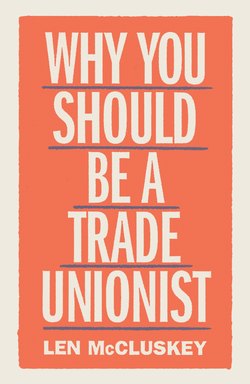Читать книгу Why You Should be a Trade Unionist - Len McCluskey - Страница 9
На сайте Литреса книга снята с продажи.
Оглавление3
UNITY IS STRENGTH
A trade union is like a bundle of sticks. A worker who is not in a union is like a single stick. She can easily be broken or bent to the will of her employer. An employer can do without one worker. He cannot do without all his workers.
Mary Macarthur (1880–1921)
Too often we hear the lament: ‘I can’t join a union because there isn’t one where I work.’ But all trade unions have to start somewhere, and it does not require the prior approval of union officials, or recognition by an employer, for a union to exist. The history of trade unions demonstrates that they are essentially no more than a group of workers coming together to defend rights that are under attack, to demand rights they do not yet have, and to improve pay and conditions.
The first thing a would-be activist needs to do is find the appropriate union to join. The TUC hosts a find-a-union service on its website.1 Some unions, including Unite, have an online joining facility, so there is no need to make a phone call during working hours or to arrange a clandestine meeting with a union official in order to sign up. At the same time, the new union member will need to talk to colleagues about the issues they are unhappy or concerned about – long hours, fair pay, overtime, health and safety, bullying, sexual harassment, and so on – and persuade them that by joining together in a union they can address these issues and make demands. But there’s no magic wand – the mere act of a few people joining a union won’t solve such problems. Only by standing together collectively can we do that.
Let’s assume we have a workplace of young people in, say, the IT or hospitality sectors, where union membership is low but dissatisfaction high, and exploitative working practices are widespread. The TGI Fridays activists, for example, built their union starting with only a handful of members; they were not going to wait for a union to approach them. They used WhatsApp, Facebook and other online platforms to persuade and support colleagues in restaurants around the country.
The result was a strike that emerged from below, one that did not need a union headquarters to run it. Instead, just a handful of members began to recruit and organise in their own way, building a union based on collectivism and the recognition of shared conditions. They swiftly realised that there is power in numbers and that their voice was stronger as a collective. This in turn gave them the confidence needed to win support for a strike ballot. The TGI workers chose to join Unite. Workers at McDonald’s and Wetherspoons went for the bakers’ union, the BFAWU. Others in precarious sectors, such as Uber, have gone with the GMB, and we’re also seeing people in the gig economy joining what are being dubbed ‘pop-up’ unions like the IWGB (Independent Workers Union of Great Britain).
In another example, Google UK may have a fabulous new headquarters building in London’s King’s Cross, but the workplace issues that its staff encounter are as commonplace as in any other office. Sexual harassment and a lack of pay transparency are just the most obvious. There was no union at Google UK, but one employee was convinced they needed one and took the first step. They contacted our local rep and met for a chat in a pub. Leaflets were produced and before long there was a core membership of about thirty. It was not a lot, but it was a start, and it resulted in our members, and other Google employees in London, joining the international walkout in 2018 over how the company tackles allegations of sexual harassment.2 On this occasion union membership gave workers the strength to stand up to unacceptable behaviour in the workplace. Is this why people are so scared of trade unions?
Rebecca Long-Bailey, the shadow industry secretary as I write, was once asked by a journalist whether Labour’s policies on empowering trade unions, enabling them to work alongside a Labour government, were not something of a problem. Wouldn’t people be afraid of unions ‘taking over’? Rebecca asked him if he knew what a union was. I am not sure if he did, but she told him anyway: ‘A union is a group of workers, it can be as big or as small as you like. But it’s about those workers coming together collectively to demand respect at work, a safe working environment, decent pay,’ she explained. ‘Not only that, they are economically beneficial to employers.’
Unity is strength, on the factory floor, in the office, on the building site, in the restaurant, on the road – wherever we sell our labour.
